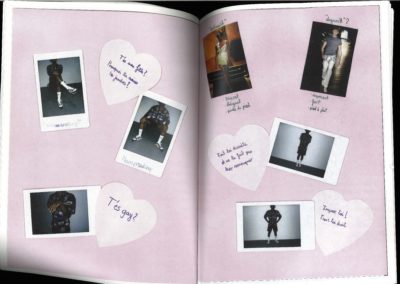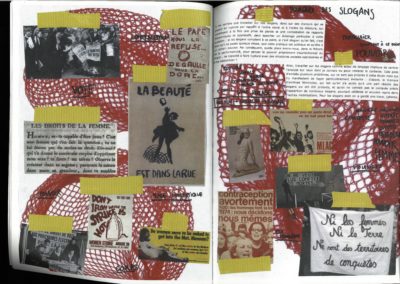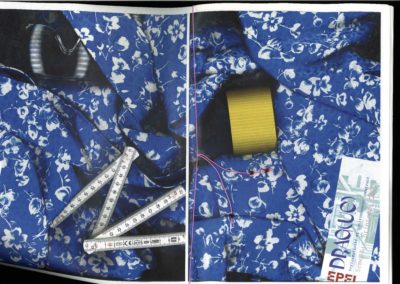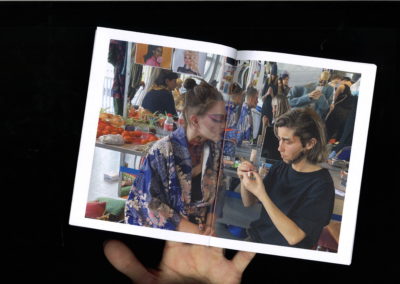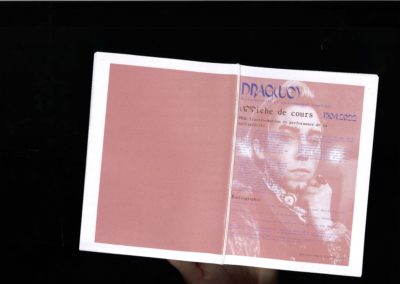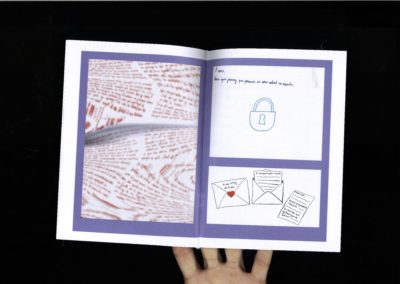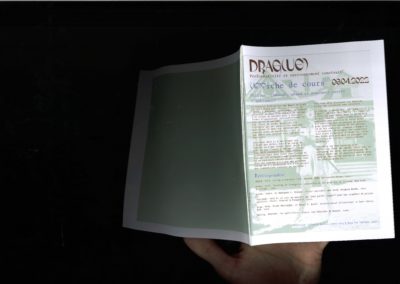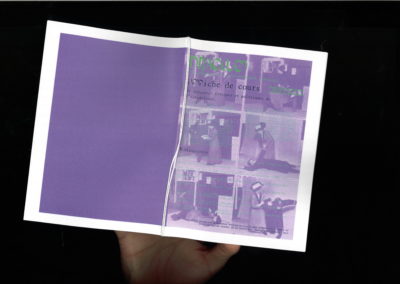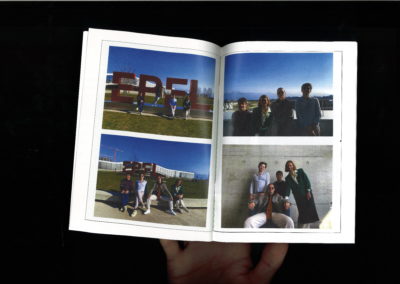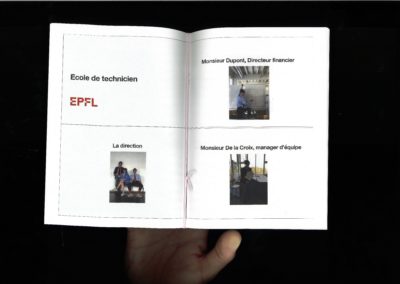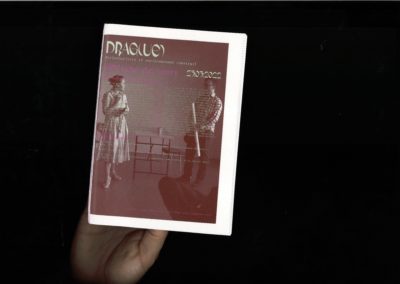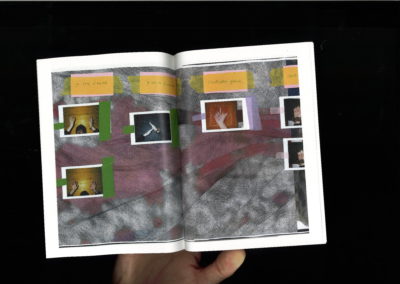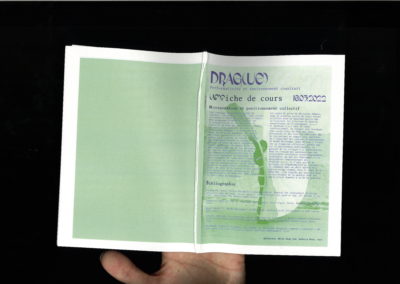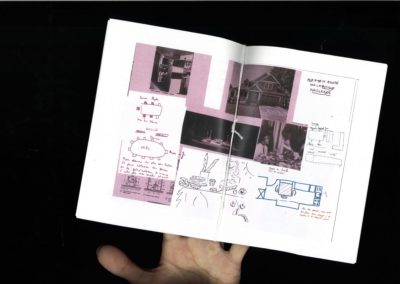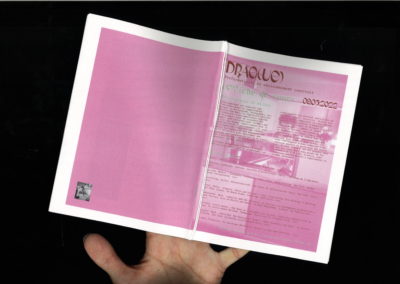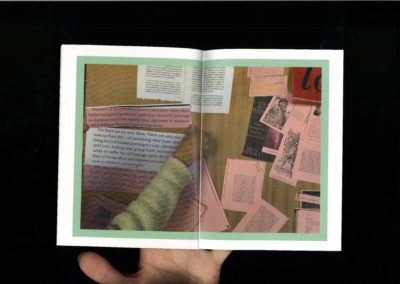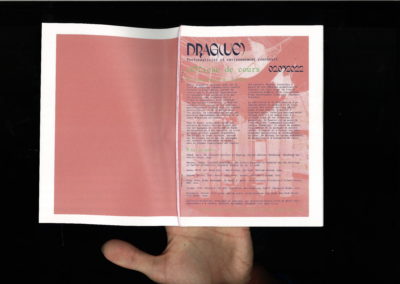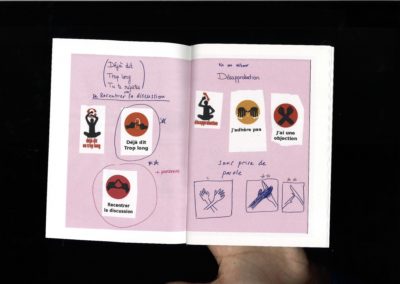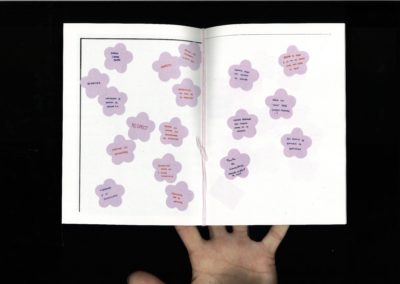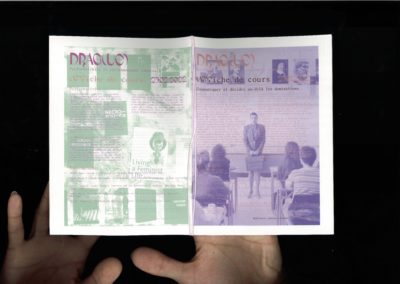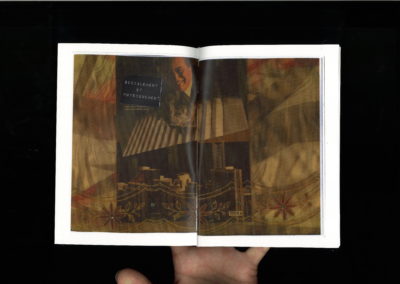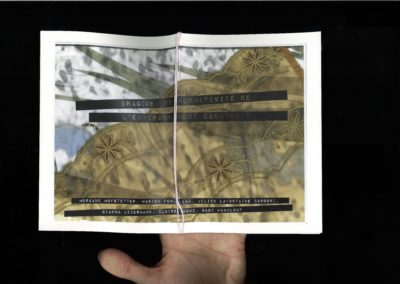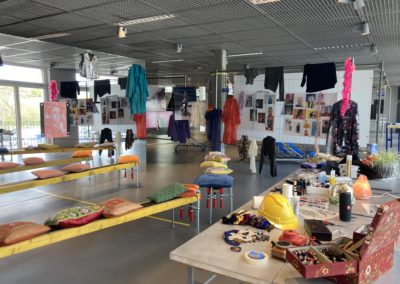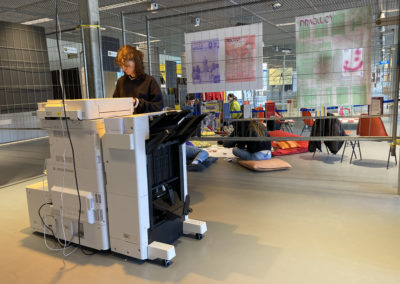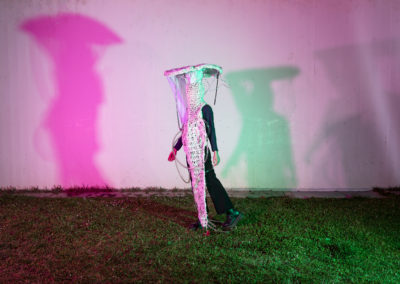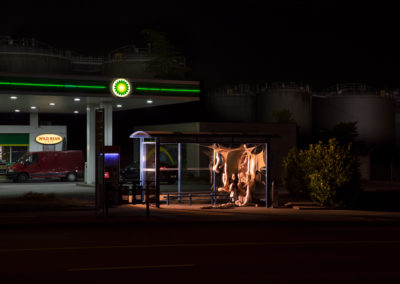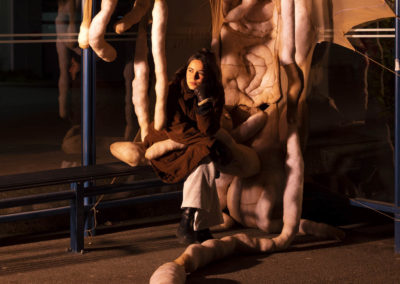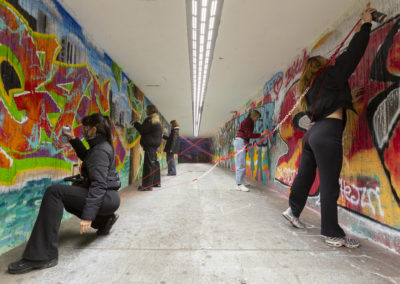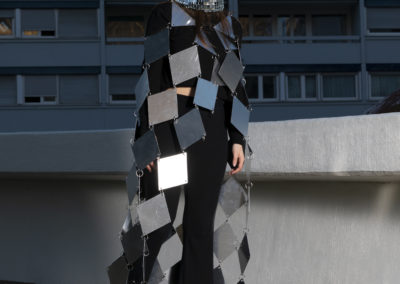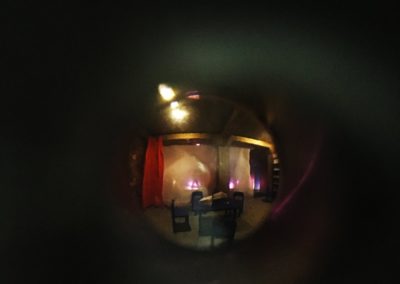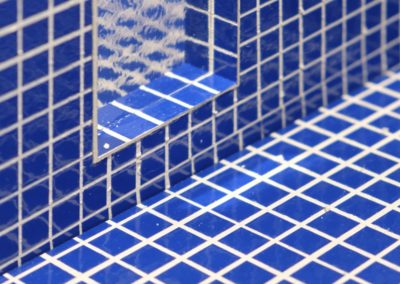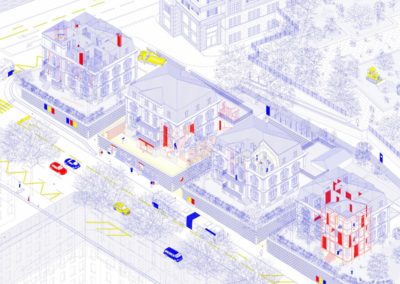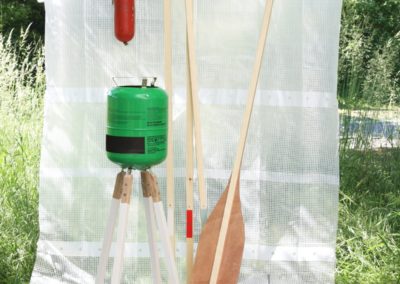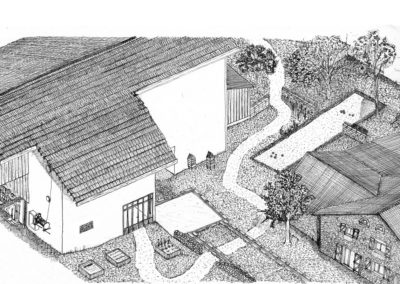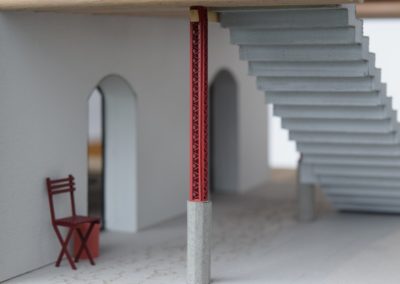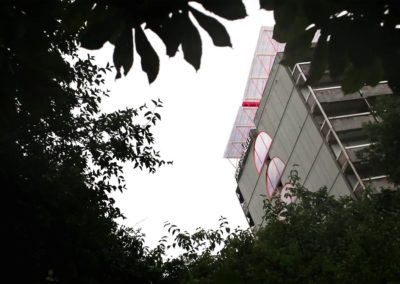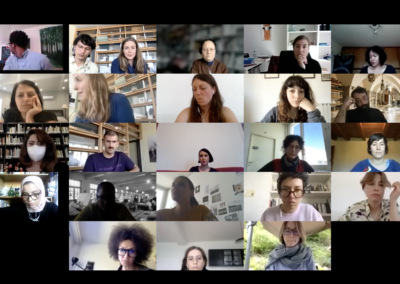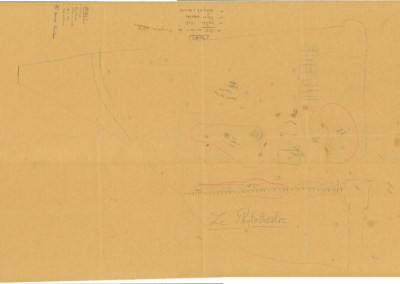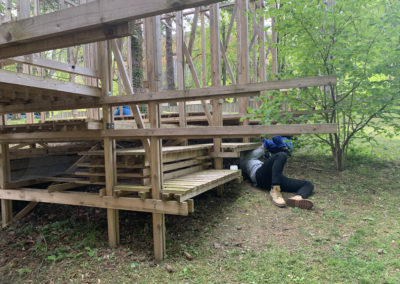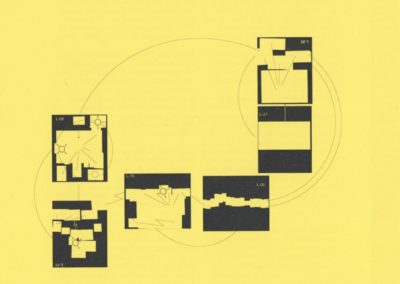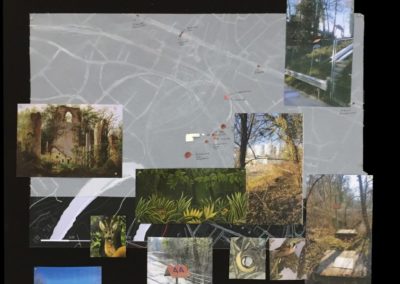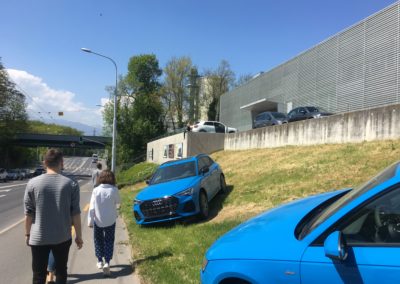doctoralcourse
Minoring Architectural Research_info
“Minoring Architectural Research.” Doctoral Course organized by Lucía Jalón Oyarzun. A theoretical and practical reflection on the possibilities, positions and methodologies of a minor approach to architectural research will reveal key concepts and tools to establish a critical position, build a situated architectural investigation and produce research materials otherwise.
23.10.2023 – 30.10.2023.
Minoring Architectural Research_image
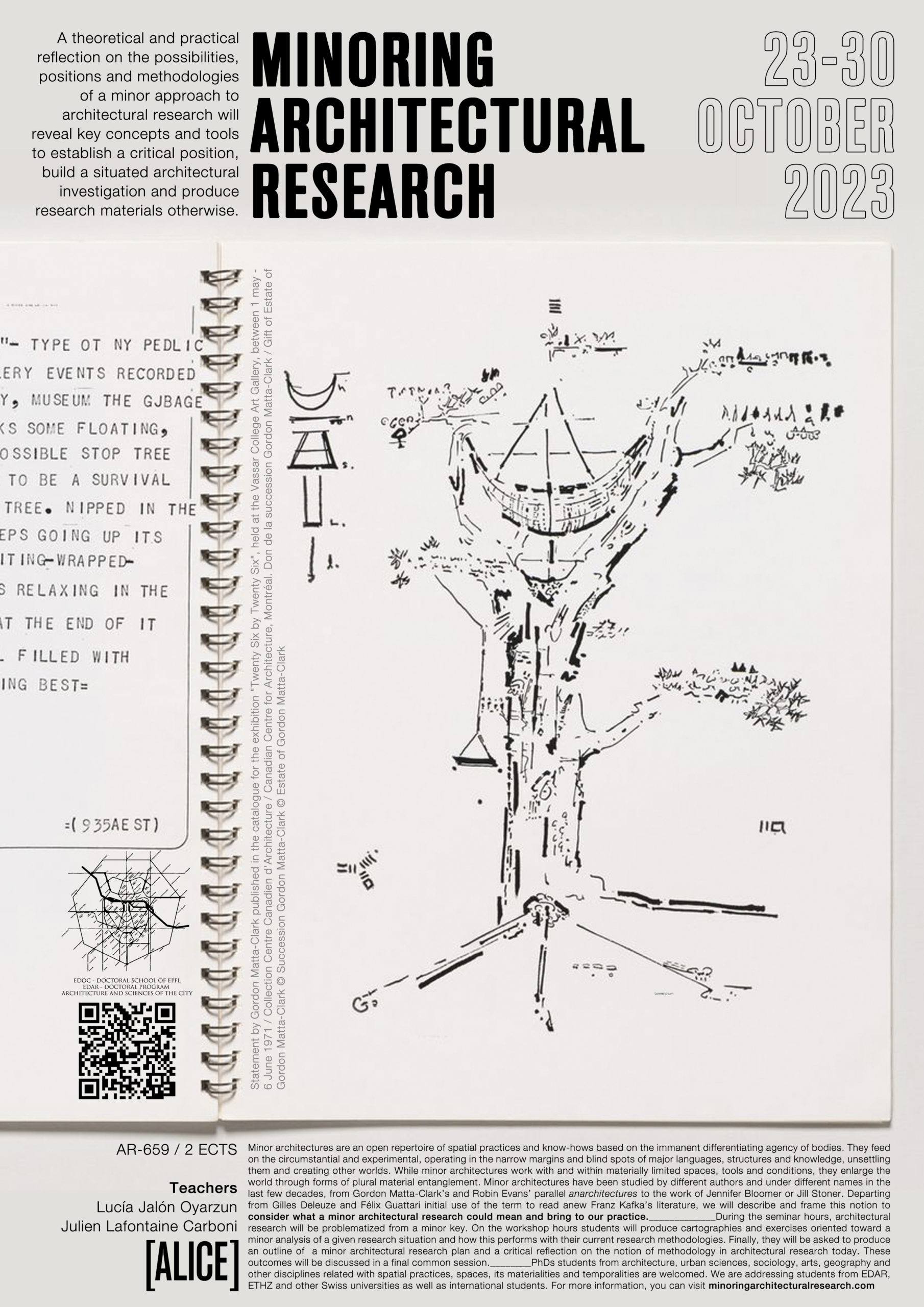
Minoring Architectural Research_text
Minor architectures are an open repertoire of spatial practices and know-hows based on the immanent differentiating agency of bodies. They feed on the circumstantial and experimental, operating in the narrow margins and blind spots of major languages, structures and knowledge, unsettling them and creating other worlds. While minor architectures work with and within materially limited spaces, tools and conditions, they enlarge the world through forms of plural material entanglement. Minor architectures have been studied by different authors and under different names in the last few decades, from Gordon Matta-Clark’s and Robin Evans’ parallel anarchitectures to the work of Jennifer Bloomer or Jill Stoner. These practitioners have sought to unveil those practices affecting the organization of our everyday space—how bodies interact, how environments mediate. From those origins, we seek to conceive within this doctoral course what a minor architectural research could mean and bring to our practice.
Departing from Gilles Deleuze and Félix Guattari initial use of the term to read anew Franz Kafka’s literature, we will describe and frame this notion as a way of working with the living and material core of architectural practices, as well as its relations with the major practices and languages of the discipline and its institutions. We will consider the relation between that living and material core and political agency, to reframe the relation between spatial practices and the imaginaries and actions of the multitude around our living together. To do this we will contemplate the potentialities of studying, both in historical and operative terms, the conflict of the spatial forms and practices of the major languages and those of minor practices.
We will also consider a different genealogy of the architectural body, against (and beyond) the Vitruvian man and the ideal of a singular, male, able, white body and its ensuing geometries and decisions, we will follow the many (other) bodies of spatial practice, from the non-male and racialized body to the overflowing body, the plural body, the formless body, and a long etcetera. Around them, we will define a series of notions, from individual and plural spatialities, touch, traces, dispositions, and ecologies of signs. This exercise will help us articulate a minor vocabulary able to analyze otherwise material practices and conflicts from an architectural lens.
Alongside, we propose to explore the uneven relations of architectural research to temporalities both in its objects and subjects of knowledge. Effectively, the minor enables us to reconsider the proximities and distances of plural temporalities to our worlds, questioning the presents, pasts, futures, future pasts and past futures and their a/effect on the actual, and how they are produced and reproduced. It unveils in which way the past as an epistemological category has been used as an imperialist instrument of relegation and subjugation of practices and knowledge, and how the minor, as a contact zone, invites us to dissolve Time in plural temporalities to work with.
From that minor framework, we will then consider its consequences for architectural research and develop a series of considerations, explorations and tools to propose a minor conceptualisation of architectural methodologies of research. The participants in this doctoral course will be invited to apply them in a case study corresponding to their ongoing PhD thesis that will be worked upon throughout the duration of the course. The participants’ outcome will be this minor analysis, a preliminary outline of a minor research plan to follow up on their initial findings and a critical reflection on the notion of methodology in architectural research. For students who don’t have a situation of analysis (or not yet), one case study will be provided to develop their minor analysis.
teachingunit
DRAG(UE)_info
DRAG(UE), Performativities of the built environment, SS21 and SS22, EPFL, with BA6 in architecture, civil engineering and environmental sciences (ENAC). SS21 with Marion Fonjallaz, Morgane Hofstetter, Claire Logoz, Gianna Ledermann, Nagy Makhlouf, SS22 with Kyra Michel and Noémie Zurbriggen.
DRAG(UE)_image
DRAG(UE)_text
The DRAG(U.E.) teaching unit proposes to explore the (socially and physically) built environment through its performativity (Butler, 1990) by introducing the perspectives offered by gender studies, queer theories, de/postcolonial studies and urban sociology. Performativity is understood as the reproduction by individuals and our environments of social norms that are applied to us through socialization and subjectivization. This performative subjectivity defines the framework of our agency in our societies.
DRAG(U.E.) introduces participants to a series of concepts and discussions, making it possible to critically analyze their environments constructed from these social frameworks and norms. The DRAG( U.E.) will include the following sidesteps: the first look (the performative approach), the twist (performativities of norms and realness), and the negotiation (institutional critique (Reimer, 2021)). These sidesteps will allow participants to understand the historical and social construction of their disciplines and their subjectivities within them in order to renegotiate them.
SS21 students:
Emma Ghislaine Marie Bérard / Sofia Chajon Gomar / Marie Valentine Catherine Chatain / Nina Thuy Cruchaud / Anton Robin Djerbi / Ali Elguindy / Marion Fonjallaz / Morgane Hofstetter / Sanad Jouhari / Julien Lafontaine Carboni / Gianna Morgane Ledermann / Claire Ana Logoz / Nagy Makhlouf / Lino Tarek Marcé / Luis Melgar / Maud Armelle Anne Nguyen Huynh / Jonas Pacific Nkiambi / Maria Ruiz Medina / Jessica Schneider / Fatema Sebti / Katarzyna Maria Stachnio
Graphical design by Claire Logoz.
workshop
Des Corps dans la Nuit_info
Gender dynamics, normative transgressions, solidarities and self-defenses, Workshop organized with Paule Perron, 21.02.2022 – 25.02.2022, HEAD – Genève x EPFL.
Des Corps dans la Nuit_text
Des corps dans la nuit analyzes the materiality of nocturnal spaces -its sensory, programmatic, atmospheric or separative qualities- and how they participate in the perpetuation of the capitalist and patriarchal domination matrix. Profusely fantasized and represented as time-spaces of all dangers, insecurities and risk-taking at the charge of the victims -often female-, the nights of Western cities are also claimed and invested as possible territories to subvert, divert, disturb, and transform the established patriarchal norms. “Making Space“, the title of the manifesto of the feminist architects’ collective MATRIX from the 1980s, announces an architectural strategy of resistance through space.
When Iris Marion Young defines in 2002 the notion of gender as: “a particular form of social positioning of bodies experienced in interaction with each other within historically and socially determined institutions and processes that have material effects on the environment in which people act and reproduce power relations and privileges among themselves”, she underlines the central role of spatial experience in the social construction of gender. The transformation of the inhabiting bodies’ environment, the architectural action, seems then to open the possibility of a subversion of the normative structures in action through the lived experience of space.
During this workshop, we began to unravel the night’s western imaginaries as a space-time of fear, insecurity, and abnormality, producing a gendered polarization of bodies and urban spaces. Through feminist/queer methodologies, we explored the night as a possible place to renegotiate domination patterns. We explored spatialized and spatializing subjectivities to outline how night spaces support these violences and to thwart them. The transformation of our bodies’ environment -from clothing to the street- will be a vector for a possible resistance through space. We will delve into protection, spectacularization, disappearance, disturbance as strategies of performative self-defense, on the surface of the skin, through the lived sensory experience of a gendered body in its constructed environment.
To approach these mechanisms and potentially subvert them, each group of students combined a night site in the city of Geneva, an architectural project strategy, as well as a film/series/novel scene. These combinations allowed them to situate and position their research. The scene, translated to the Geneva site, allowed us to analyze the intersection of time, space and social situations, considering the bodies, socializations and subjectivities that inhabit the night world.
To embody these intersections of human and non-human bodies, temporalities, and social processes, we worked during the week on the construction of photographs that stage and situate the performative objects and bodies. Mock-up, collage, and drawing have been used to construct the frame, the point of view, and the elements of each scene.
Students: Nour Keller (EPFL), Valentine Robin (HEAD Bijoux), Ilona Roux (HEAD Mode), Meryem Saffi (HEAD EPFL), Fanny Tauxe (HEAD AI), Léa Porretta (HEAD Cinéma), Lou Tissot Daguette (HEAD AI), Alice Proietti (EPFL), Léo Taillefer (EPFL), Salome Djeranian (HEAD Arts Visuels Cinéma), Aurora Lajci (HEAD AI), Théotime Serre (HEAD Media Design), Waldemar Fierro Rubio (EPFL), Mélissa Steenman, Louise Chappuis, Noa Sbaï.
Photography by Morgan Carlier, Pool Photos HEAD – Genève
masterthesis
Master Thesis_info
Master thesis tutored with Dieter Dietz and Ruben Valdez for the session 2021, 2022 and 2023, at EPFL.
Master Thesis_text
doctoralcourse
Unearthing Traces_info
“Unearthing Traces. Dismantling the imperialist entanglements of archives and the built environment.” International Conference and Doctoral Course organized by Denise Bertschi and Julien Lafontaine Carboni, with the support of Lucia Jalon Oyarzun, Stéphanie Ginalski, and Yves Pedrazzini. 28.05.2022 – 30.05.2022.
Unearthing Traces_text
With the swissuniversities doctoral course Unearthing Traces we propose to explore and learn about memory processes, power structures in archival practices in relation to the built environment and material architectural traces. With the participation of a wide array of thinkers and practitioners in archival and artistic practices, historians and researcher in architecture and social sciences, the course explores how imagined records and traces can be composed and grounded in the context of academic research in order to implement them into a historical argumentation. A particular emphasis will be made on architectural and spatial traces and records both through the methodologies of urban critical and postcolonial studies and through questioning the imperialist dimensions of the architecture of archives and built environments. After two days in the form of a conference, the fieldwork in Neuchâtel constitutes both an opportunity to actively apply these methodologies, and to question the colonial entanglements of Switzerland through a collective and embodied research process in situ. Students across different disciplines — architecture, history, arts, political sciences — will be solicited, in order to decompartmentalize disciplines in this process.
Engaging with the local context of Neuchâtel as one of the most implicated Swiss cities in a “colonial Switzerland without colonies” (Purtschert 2012), we aim to rehearse (Azoulay, 2019) a set of methodologies in tracing architectural structures and spacial situations regarding their material histories and political/economical existences. Switzerland was considered for a long time to be uninvolved in colonialism, supported by the narrative of its “neutral” role in world politics. Newer research has proved otherwise: The Swiss entanglement in a colonial world system as a quasi-imperialist power (Fischer-Tiné 2015) was marked by its strong interconnectedness through a Swiss economic expansion in a global trade system based on capitalist agriculture, land expropriation and deforestation or transit-trade with colonial goods as coffee, textiles or precious stones. Its surplus flowed back into the Swiss system, its built cities and institutions. To investigate these material witnesses (Schuppli 2020) of such historical connectedness, we will visit in Neuchâtel the following sites: the Villa of the Museum of Ethnography (MEN), the Hospital of Préfargier, the Place de Pury, the Espace Tilo Frey (formerly Espace Louis-Agassiz), and others.
The conference and doctoral course are continued through a publication which explores the politics of memory at the intersection of archives and the built environment bringing in a wide array of perspectives, methods and practices to unearth and dismantle traces of colonialism and coloniality within European urban environments. The conference gathered international scholars and artists, such as Françoise Vergès, Léopold Lambert, Rohit Jain, Nolan Oswald Dennis, Shourideh Molavi, Samia Henni, Hollyamber Kennedy, Michelle Caswell, Jovita dos Santos Pinto, Faustin Linyekula, Abdessamad El Montassir and Doreen Mende to whom we are grateful for their generosity and implication in the project.
Photography by Denise Bertschi.
workshop
Land of Thousand Dances_info
Workshop SS21 and SS22, “Land of thousand dances, imagination and pedagogies of maintenance labor”, with Camille Fauvel, Julien Gamerro, Nicolas Rogeau and Camille Fréchou.
Land of Thousand Dances_text
Caring is a reproductive work (Federici, 2014), of maintenance, of upkeep, of reproduction of the existing. The lexical field of the reproductive -verbs preceded by the prefix -re- indicates a priori an absence of imaginary and inventive act. However, by starting from these numerous bodies (human, non-human, architectural) and their uses, reproduction opens the field of possibilities, and makes room for their previously vulnerable existences.
From a shelter for teenagers who smoke weed when it rains to a play structure for children when the weather is good, the reproductive and programless project allows what (is) happening (time, people and the destruction of worlds by extractivist capitalism) to be the very space of invention, from marginality to room for maneuver. Leaving room for the futurities of the already-there and the uncertainties that characterize it, following the flow of materials and bodies to work with these inventive forces (Ingold, 2010), so many practices that allow us to consider reproduction as a transformative horizon (Haraway, 2016). In this paper, we wish to explore the inventive potential of care and reproductive work in architecture by interrogating it in the context of a pedagogical experiment.
To study and transmit the practice of this notion, we set up a transdisciplinary course within ENAC, EPFL. Intensive format over a full week, this workshop is part of a compulsory elective course and is aimed at 2nd year undergraduate students in architecture, civil engineering and environmental science. It brings together students who have already studied the subject for a year and who are at least interested in it.
teachingunit
Atlas Poliphilo_info
Teaching Unit SS18 and SS19, “Atlas Poliphilo” with Dario Negueruela del Castillo, Dieter Dietz, and Aurélie Dupuis.
Atlas Poliphilo_text
This course focuses on techniques and methods for an open and systematic compilation of images. Forms of visual information are major manifestations of a culture and will be explored in respect to their symbolic, intellectual or emotional power. All these documents ask for a proper frame and knowledge for their deciphering. And they will remain open for further interpretations, as does a work of art (see Umberto Eco, Opera Aperta,1969).
While the exploration of instruments from diverse fields of expertise will help us to better analyse and understand given questions and problems, the output of these instruments bears new potential for knowledgeable associations. A holistic vision of a given problem may relocate it at the outset and new questions may have to be asked, not necessarily evolving directly out of a specialised and specific focus, but rather appearing in the ‘situatedness’ of a given problem and its complex interdependencies.
Atlas Poliphilo is open to civil/environmental engineering and architecture students. The unit is taught in parallel with the HEPIA Architecture du paysage with an equal number of students in landscape design. The Atlas Poliphilo Unité d’enseignement proposes a range of techniques in surveying, combining most recent engineering software and research with recent findings in art history and digital humanities – offering a critical and in depth insight into vital questions relevant to our environment and us as human species. In particular the crossing of the capacities of engineers with those of architects and landscape architects, will offer to all students a thorough transdisciplinary experience and crucially enhance the operational capabilities in their own field.
Space is hypothetised as a common support for individual and collective articulation of interactions. Each year the students will survey a given territory of the Region Lémanique. Specific mapping techniques will permit them to produce visual descriptions of dynamic phenomena in space. Inputs from complementary disciplines will allow for the exploration of further methods of visual transcription according to different approaches : systemic, experiential and prospective.
Students will then engage an interdisciplinary discussion informed by the results of their investigations. Visions of the territory will emerge from the conversation between visual data as much as from the discursive exchange between all the participants. The UE therefore places equal emphasis on the different aspects of the course: fieldwork, collection of data, representation, interpretation and discussion.
